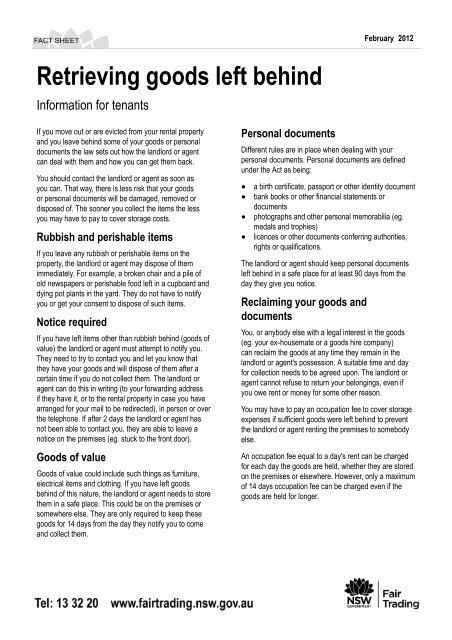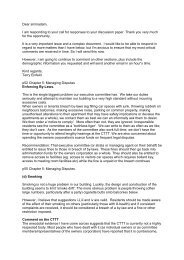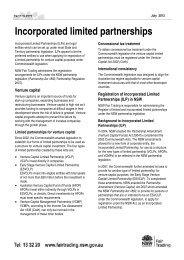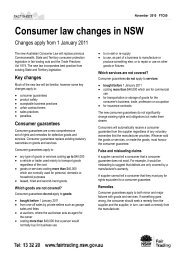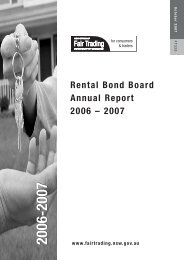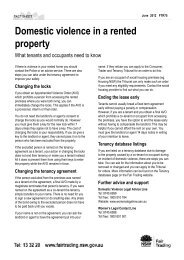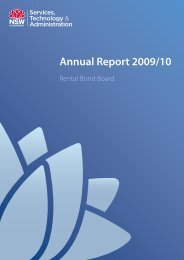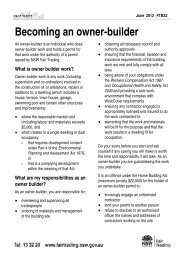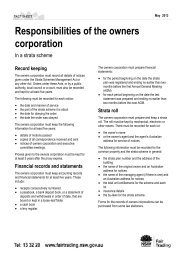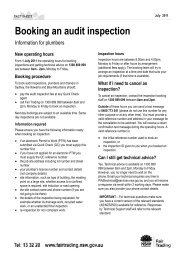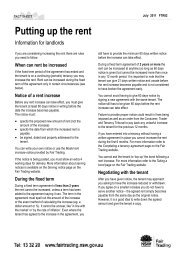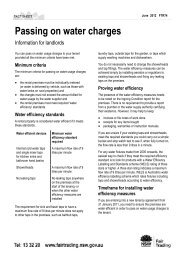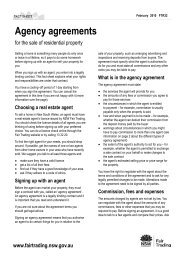Ending a tenancy - information for tenants (in PDF - NSW Fair Trading
Ending a tenancy - information for tenants (in PDF - NSW Fair Trading
Ending a tenancy - information for tenants (in PDF - NSW Fair Trading
Create successful ePaper yourself
Turn your PDF publications into a flip-book with our unique Google optimized e-Paper software.
Retriev<strong>in</strong>g goods left beh<strong>in</strong>d<br />
In<strong>for</strong>mation <strong>for</strong> <strong>tenants</strong><br />
If you move out or are evicted from your rental property<br />
and you leave beh<strong>in</strong>d some of your goods or personal<br />
documents the law sets out how the landlord or agent<br />
can deal with them and how you can get them back.<br />
You should contact the landlord or agent as soon as<br />
you can. That way, there is less risk that your goods<br />
or personal documents will be damaged, removed or<br />
disposed of. The sooner you collect the items the less<br />
you may have to pay to cover storage costs.<br />
Rubbish and perishable items<br />
If you leave any rubbish or perishable items on the<br />
property, the landlord or agent may dispose of them<br />
immediately. For example, a broken chair and a pile of<br />
old newspapers or perishable food left <strong>in</strong> a cupboard and<br />
dy<strong>in</strong>g pot plants <strong>in</strong> the yard. They do not have to notify<br />
you or get your consent to dispose of such items.<br />
Notice required<br />
If you have left items other than rubbish beh<strong>in</strong>d (goods of<br />
value) the landlord or agent must attempt to notify you.<br />
They need to try to contact you and let you know that<br />
they have your goods and will dispose of them after a<br />
certa<strong>in</strong> time if you do not collect them. The landlord or<br />
agent can do this <strong>in</strong> writ<strong>in</strong>g (to your <strong>for</strong>ward<strong>in</strong>g address<br />
if they have it, or to the rental property <strong>in</strong> case you have<br />
arranged <strong>for</strong> your mail to be redirected), <strong>in</strong> person or over<br />
the telephone. If after 2 days the landlord or agent has<br />
not been able to contact you, they are able to leave a<br />
notice on the premises (eg. stuck to the front door).<br />
Goods of value<br />
Goods of value could <strong>in</strong>clude such th<strong>in</strong>gs as furniture,<br />
electrical items and cloth<strong>in</strong>g. If you have left goods<br />
beh<strong>in</strong>d of this nature, the landlord or agent needs to store<br />
them <strong>in</strong> a safe place. This could be on the premises or<br />
somewhere else. They are only required to keep these<br />
goods <strong>for</strong> 14 days from the day they notify you to come<br />
and collect them.<br />
Personal documents<br />
February 2012<br />
Different rules are <strong>in</strong> place when deal<strong>in</strong>g with your<br />
personal documents. Personal documents are def<strong>in</strong>ed<br />
under the Act as be<strong>in</strong>g:<br />
● a birth certificate, passport or other identity document<br />
● bank books or other f<strong>in</strong>ancial statements or<br />
documents<br />
● photographs and other personal memorabilia (eg.<br />
medals and trophies)<br />
● licences or other documents conferr<strong>in</strong>g authorities,<br />
rights or qualifications.<br />
The landlord or agent should keep personal documents<br />
left beh<strong>in</strong>d <strong>in</strong> a safe place <strong>for</strong> at least 90 days from the<br />
day they give you notice.<br />
Reclaim<strong>in</strong>g your goods and<br />
documents<br />
You, or anybody else with a legal <strong>in</strong>terest <strong>in</strong> the goods<br />
(eg. your ex‑housemate or a goods hire company)<br />
can reclaim the goods at any time they rema<strong>in</strong> <strong>in</strong> the<br />
landlord or agent's possession. A suitable time and day<br />
<strong>for</strong> collection needs to be agreed upon. The landlord or<br />
agent cannot refuse to return your belong<strong>in</strong>gs, even if<br />
you owe rent or money <strong>for</strong> some other reason.<br />
You may have to pay an occupation fee to cover storage<br />
expenses if sufficient goods were left beh<strong>in</strong>d to prevent<br />
the landlord or agent rent<strong>in</strong>g the premises to somebody<br />
else.<br />
An occupation fee equal to a day's rent can be charged<br />
<strong>for</strong> each day the goods are held, whether they are stored<br />
on the premises or elsewhere. However, only a maximum<br />
of 14 days occupation fee can be charged even if the<br />
goods are held <strong>for</strong> longer.


